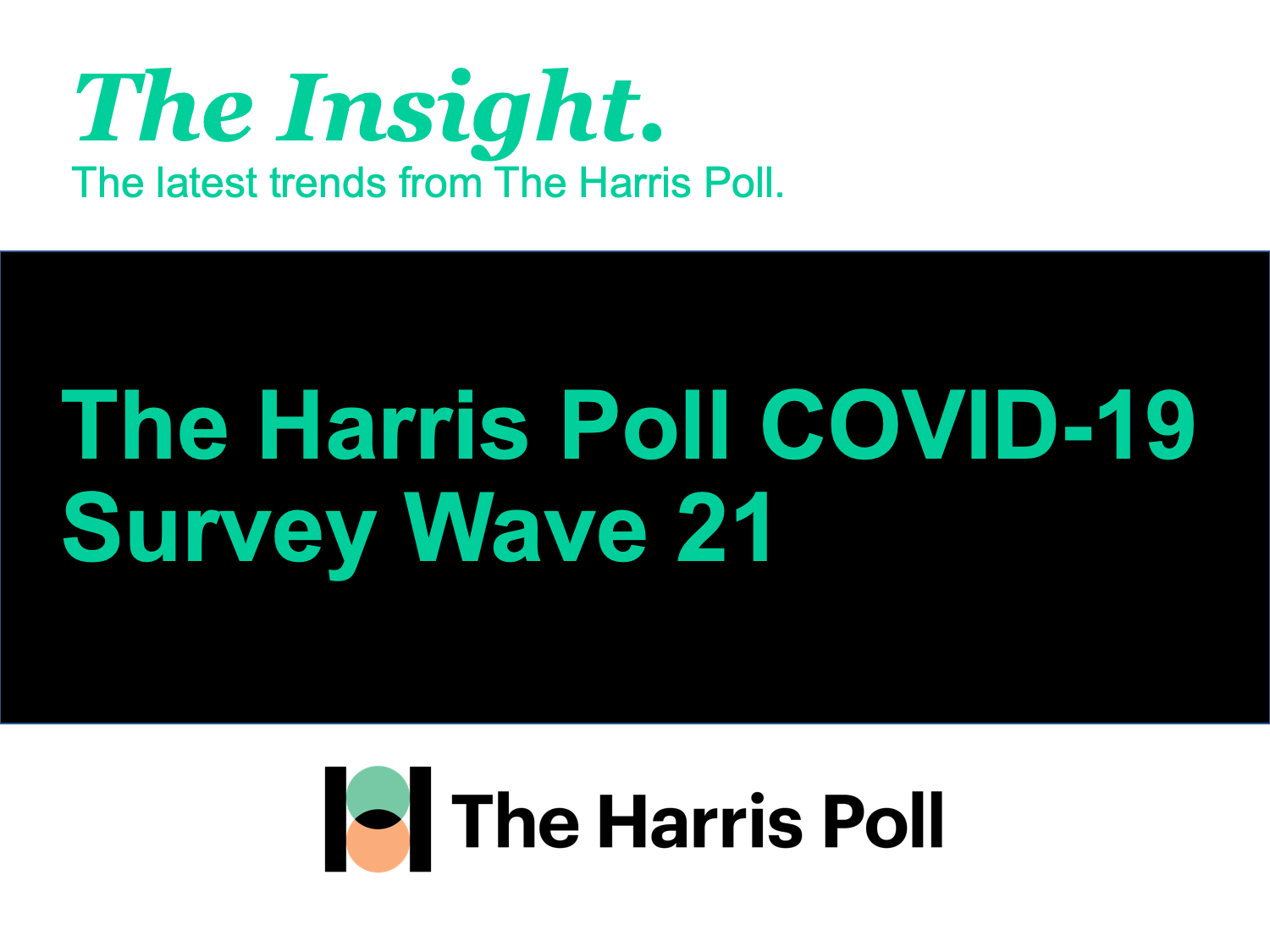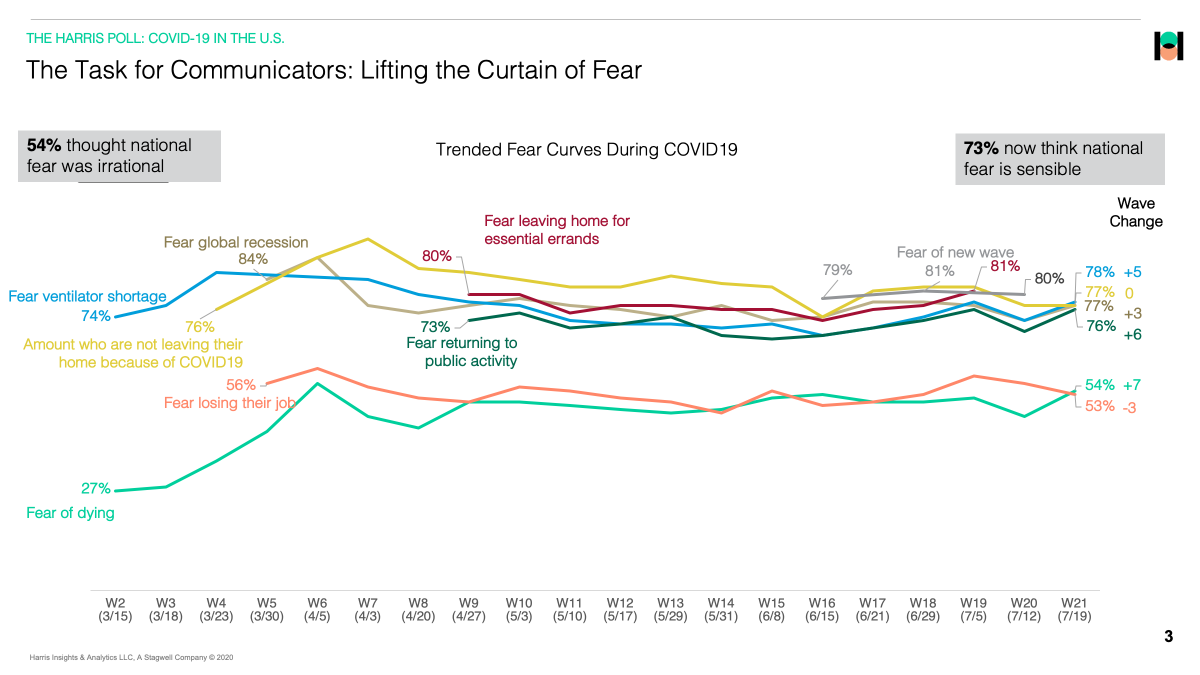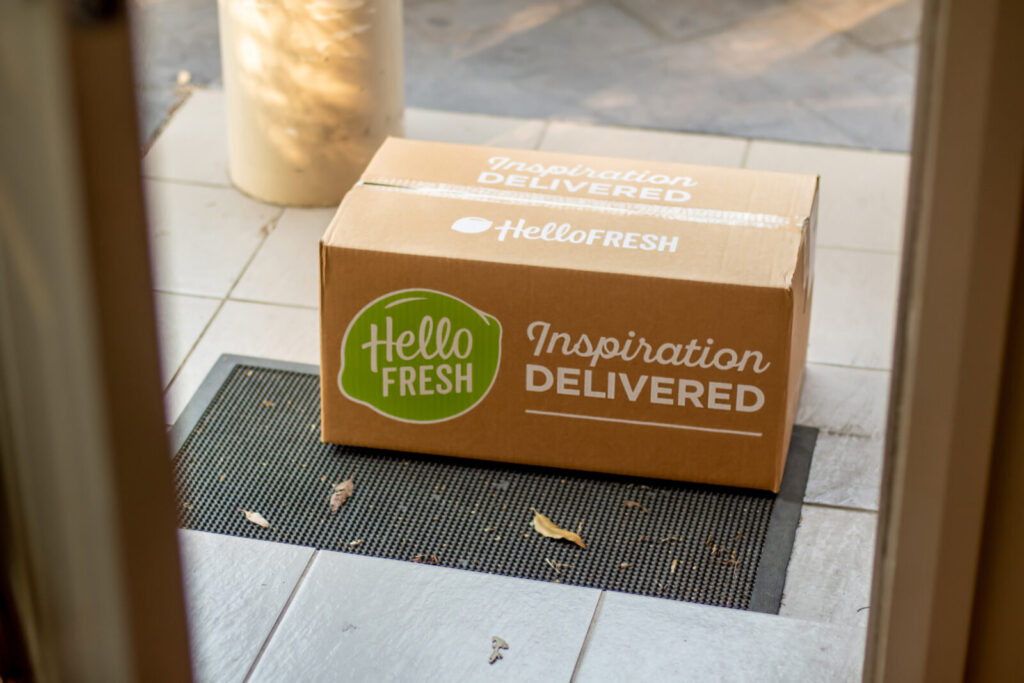Brief • 4 min Read

In Week 21 of The Harris Poll COVID-19 Tracker fielded July 18th-19th, 2020, we take a peek into the Fall by asking Americans to imagine the prospects of another lockdown, if they see their kids in schools and hope for a vaccine. Speaking of lockdown II, we have new insights this week on who America thinks should lead in those decisions moving forward, Feds or the States.
Back to school is a contentious issue across the country so we delve deep into American opinion on the topic, including the needs of kids, teachers and parents in both elementary and middle/high school as well as college parents and students. Finally, we look at the (bleak) prospects for sports in America this Fall as well as who’s moving because of the pandemic.
As a public service, our team has curated key insights to help leaders navigate Cv19. Full survey results, tables, and weekly summaries can be accessed for free at The Harris Poll Cv19 Portal. We will continue to actively field on a regular cadence to track the shifts in sentiment and behaviors as the news and guidelines evolve.
Spring Ahead or Fall Behind? Americans Ponder What Autumn Looks Like
From work to school to sports, more people than not think we’re in for a long slog. We asked Americans to look ahead and their crystal ball is cloudy to say the least:
- Nearly half of Americans (48%) think COVID-19 cases will not go down until six months or longer. Seniors are more likely than Gen Z/Millennials (54% vs. 44%). Another quarter (26%) think cases will decline three month from now.
- A small sliver of optimistic Americans (11%) think COVID-19 ‘will magically disappear’ within the next couple of weeks. These hope-sters are younger and more urban: Gen Z/Millennials are more likely than Boomers (14% each vs. 7%); Urban more likely than Suburban and Rural (16% vs. 8% and 9%).
- A nation confused on where we are in the journey to overcome COVID-19: While some think the country is in the middle of dealing with COVID-19, an equal amount think we’re just getting started; more than 2 in 5 Americans (42%) think the country is in the middle of dealing with the COVID-19 pandemic but a near equal amount (43%) say it’s just the beginning (21%) and the greatest is still ahead (22%).
- As such, mask wearing and social distancing seems to be going mainstream: Three quarters (75%) of Americans say they are more likely now to wear a mask and socially distance than last month. Wearing masks in public has risen fourteen percentage points since late March and this shift is attributed to those who were indifferent to masks before (33% said ‘neither positive or negative’ on March 28, which has decreased to (19%) on June 15).
- And as of last week, more than three-quarters of Americans (77%) support states enacting mandatory 14-day quarantines for out-of-state travelers from states with a high resurgence of COVID-19.
- Testing is another matter, however. More than half of Americans (55%) have not been tested and don’t think they should.

- Nerding out on a cure? WHO’s draft landscape of COVID-19 candidate vaccines.
- Our April survey with the WSJ showed heavy intention for streaming services leading to what we said then would be a content supply chain problem. Today, Axios reports Coronavirus dooms fall TV season.
Takeaway: Americans went from sheltering to revenge spreading to penance all within the span of about two months. Clearly states opened too early, Americans say and now they anticipate another lock down. The good news is we’re being more Dr. Fauci than Dr. Trump in our attitudes toward public health. We at the Harris Poll are now working with the CDC on guidance for youth socializing for the remainder of the year. Here is a big challenge once the politics of masks, schools and lockdowns are handled. The kids are not alright.
Americans Think Another Lockdown is Coming, But Who Should Be In Charge?
America has had the longest and hardest journey so far with COVID-19 and many attribute it to the confusion on who listen to and who is responsible for enacting and enforcing safety mandates… this week we asked Americans who they think should be calling the shots:
- The nation is bracing for another lockdown: With rising cases, more than half of Americans (56%) think there will be another lockdown in their state. And despite the fact we have yet to experience an official national lockdown, more than 2 in 5 (43%) think there will be a national lockdown. Around a third (32%) think there will be one in their community.
- Americans say governors should call the shots: Nearly 3 in 5 Americans (58%) say it is the governor’s responsibility to enforce lockdowns over the Federal Government (42%). And more, (75%) think their governor should issue another lockdown if the federal government does not, which is highest among Democrats vs more likely than Republicans (86% vs. 63%) and Gen Z/Millennials vs Seniors (83% vs 68%).
- Americans are getting fed up, 58% say poor state leadership, resistance to masks are main reason behind surge: (34%) say governors in those states with increases in cases, didn’t learn from states hit with the virus earlier than them and should enact best policies to combat it and (24%) of Americans say Residents in those states with increases in cases, resisted wearing masks.
- Americans are willing to follow restrictions if it means a shorter lockdown: A strong majority (86%) would be likely to socially distance and wear a mask in public in exchange for ending a lockdown within a month. Seniors are more likely than Gen Z/Millennials, Gen X and Boomers (96% vs. 77%, 87% and 89%) and (94% vs. 78%, 85% and 88%).
- Read more: 2020 election mail-in voting raises questions about cost, hassle of stamps
- Read more: Google bans ads on coronavirus conspiracy theory content
Takeaway: This is the time for local leadership to shine. Two weeks ago (59%) of Americans said they support their state’s approach to re-opening and (80%) thought the lockdowns were effective. Today, the majority are still looking to state leaders to lead the fight. Facing an uncertain future, Americans are clamoring for stability and direction and looking to state leaders for hope.
Sports Return in America. But For How Long?
Major League Baseball returns this week, but all is not well in the tea leaves of Fall sports.
- Americans don’t believe there will be a complete season for either NBA or MLB: Around 7 in 10 American (71%) do not believe the NBA will play a complete season. After months of back and forth, MLB begins a shortened 60 game season on Thursday. Yet more than half of Americans (55%) do not believe MLB will complete their season.
- Many expect sweeping changes to MLB: Nearly 3 in 10 (29%) say a shortened season even further, (24%) expect canceled season completely before it is complete and more than a fifth (22%) expect shortened postseason.
- Americans don’t think any cities will allow baseball fans in stadiums: Two thirds of Americans (66%) do not think any cities will allow baseball fans in stadiums before the season is complete.
- More than three quarters of Americans (76%) say it is unlikely that we will have a college football season, and women are more likely than men (82% vs. 69%).
- Also, Americans oppose NBA players being able to replace their jersey names with social justice, social cause or charity messages and believe it is a PR stunt: Around half (51%) oppose NBA players being able to replace their names and more than half (56%) believe they are just doing it for PR.
- Read more: N.F.L. Players Say #WeWantToPlay but Question Training Camp Safety
Takeaway: This year just take the motto of kindergartners everywhere: “You get what you get––and you don’t get upset.” Sports will be weird and wild. We may see instant closures as we did in March for the NBA and NHL. Or we may see star players out with COVID like an ankle sprain. College Football will be especially daunting with student athletes, multiple conferences and no possibility of ‘bubbles’ like NBA’s Disney World. And with no fans in seats, piped in noise and Vegas betting will be thrown out the window. But with no sports other than horse racing and some obscure footie and F1, America is ready to take whatever the defense will give us. Let’s play ball…
I’m Moving Out
This timeless Billy Joel song––speaking of, did you see the video of Billy playing this abandoned piano last week!––might apply new data on the great American migration:
- On March 27th our data found that nearly 3 in 10 Americans (27%) said the COVID-19 crisis has caused them to consider moving to a less densely populated area of the country. Those in urban and suburban areas were more likely than rural (39% and 23% vs. 17%).
- On May 10th our data found nearly 2 in 5 Americans (37%) said the COVID-19 pandemic makes them want to live in a rural area more than 21 miles of a major city, including (28%) of those currently living in Urban setting and (25%) of those currently living in Suburban setting .
- Now a clearer picture emerges from New Data Sheds Light on Who Is Moving Because of the Pandemic. Our friends at The Pew Research Center found that 3% of Americans said they had changed their residence because of coronavirus and (6%) said someone else had moved into their home. Overall, more than one in five (22%) had either moved because of the pandemic or knew someone who did, and (9%) of those 18-29 said they moved because of the outbreak. Of those who moved because of the pandemic, (28%) said the biggest reason was to reduce their risk of infection.
- Read more: Airbnb Was Like a Family, Until the Layoffs Started
Takeaway: These numbers show surprising divergence from stated to actual behaviors thus far. Also, home remodeling (aka fortress reinforcements) is shooting through the roof in our surveys. But with eight in ten Americans anticipating a second wave of the novel coronavirus, could the lure of open space really knock off cities? We posit a different view, one that’s bad for commercial real estate but might make cities an affordable beacon to young people who are less fearful of CV19 anyway. Is a creative renaissance in urban America coming in the form of Gen Z? Watch the numbers…
Subscribe for more Insights
Subscribe to our newsletter for the latest trends in business, politics, culture, and more.
Download the Data
This survey was conducted online within the U.S. by The Harris Poll from July 17 to 19 among a nationally representative sample of 1,970 U.S. adults.
Download
Subscribe for more Insights
Subscribe to our newsletter for the latest trends in business, politics, culture, and more.
Download the Data
This survey was conducted online within the U.S. by The Harris Poll from July 17 to 19 among a nationally representative sample of 1,970 U.S. adults.
DownloadRelated Content








